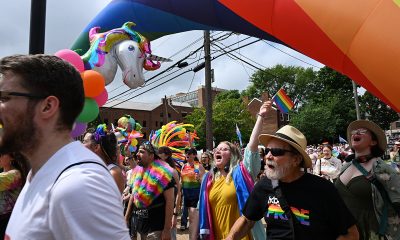a&e features
Drag legend Ella Fitzgerald returns to the stage for Capital Pride festival
Donnell Robinson on 40 years as a performer and the current political backlash against drag
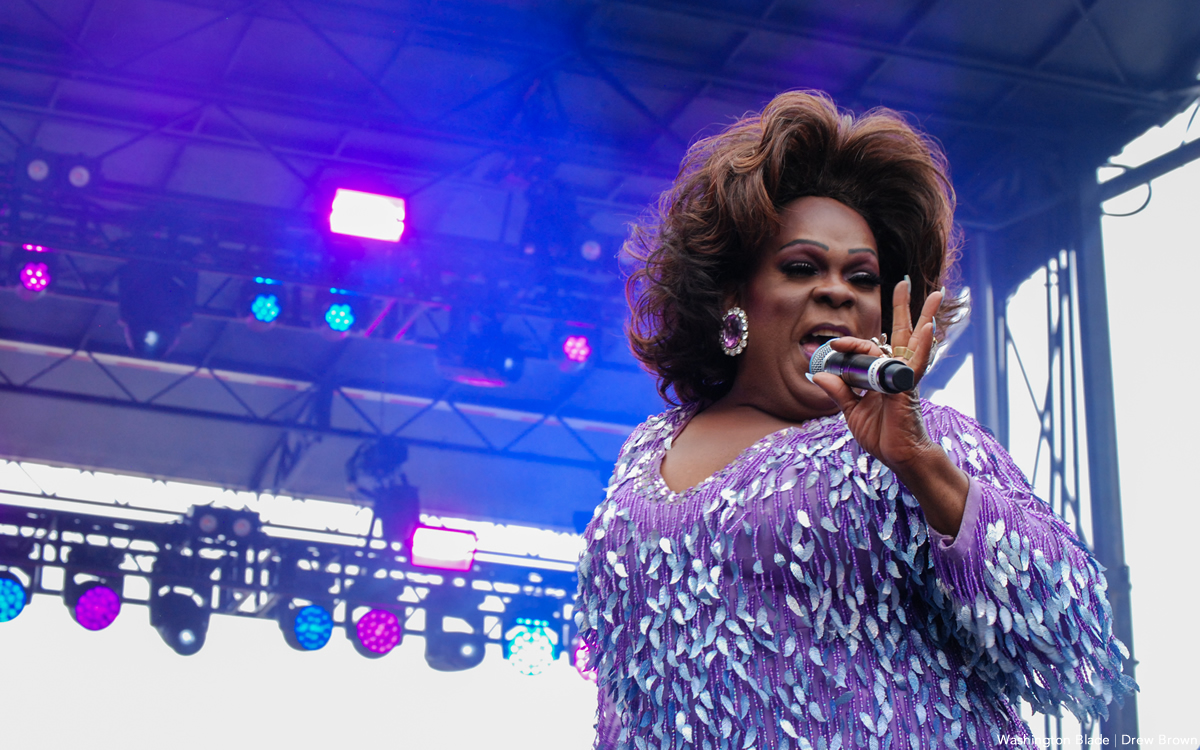
Donnell Robinson, who has dazzled audiences in the nation’s capital as the drag personality of Ella Fitzgerald for at least 40 years, has the date of Saturday, March 21, 2020, embedded in his mind.
That was the last time he performed in drag. It was at the popular Southeast D.C. nightclub Ziegfeld’s-Secrets, where Robinson performed as Ella Fitzgerald for nearly 40 years, before it, along with all city nightclubs, bars, and other “nonessential” businesses were ordered temporarily closed by Mayor Muriel Bowser in response to the COVID pandemic.
“That was the last show I did,” Robinson told the Blade in an interview at his apartment in Arlington, Va.
A short time later, around May of 2020, Robinson and all the Ziegfeld’s-Secrets employees and performers learned that the owner of the club’s building at 1824 Half Street, S.W., announced plans to demolish it to build an upscale condo building several years sooner than expected. That meant the club would not reopen when the COVID restrictions were lifted.
“So, what I recall is in May, it was the first week in May, Steven [Delurba, the Ziegfeld’s-Secrets general manager and part owner] called me and said, ‘Honey, do you have anything in the dressing room? Come and get it. The landlord called and said we must be out by the 15th.’”
Robinson said he has fond memories of meeting up with other drag performers, one of the longtime bartenders and other employees who came to retrieve their belongings in the dressing room and other storage spaces in the converted warehouse building that had served as home to Ziegfeld’s-Secrets since 2009.
And it meant at least the temporary end to a 40-year run in which Robinson (aka Ella Fitzgerald) served as emcee and lead drag performer at the Ziegfeld’s-Secrets nightclub, which began in the club’s previous location a few blocks away.
Robinson began performing as Ella Fitzgerald at The Other Side nightclub in 1980, which later changed its name to Ziegfeld’s-Secrets, at its previous location on the unit block of O Street, S.E., before it was displaced in 2006 by construction of the Washington Nationals baseball stadium.
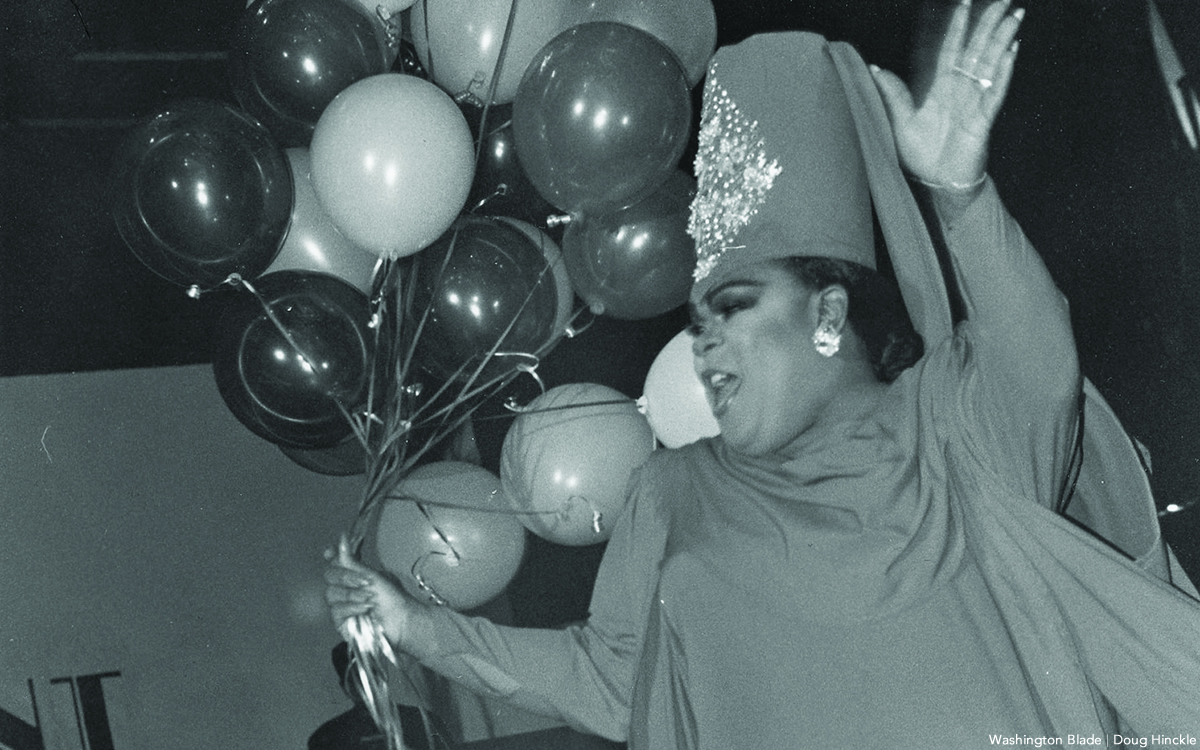
The club did not reopen until 2009, when its owners Allen Carroll and Chris Jensen, were able to obtain a lease for the 1824 Half Street building, which Carroll and Jensen renovated before reopening the club there.
All of that has become the backdrop to Robinson’s excitement over returning to the stage as Ella Fitzgerald at D.C.’s Capital Pride festival on June 11, which will take place on Pennsylvania Avenue with the U.S. Capitol as a dramatic backdrop two blocks behind the stage.
While he’s hopeful that all will go well with his upcoming performance at the Pride festival, Robinson says he is aware of the recent far-right political backlash against drag shows in states across the country.
In addition to proposed laws placing restrictions on drag shows, protests targeting drag shows, including some attempting to disrupt the shows, have also occurred in cities and states, including earlier this year in nearby Silver Spring, Md., and at a drag brunch hosted by a restaurant near the U.S. Marine Barracks on Capitol Hill in D.C.
“I have read about some of that,” Robinson told the Blade. “I haven’t been in the drag scene in three years. But I see and know what’s going on,” he said. “And my fellow drag performers who are older in my generation, I know they may be at risk. And I know I am to a degree,” he continued.
“And it’s a shame that we have to fear that we can’t present our art, our art form of drag and hope that nothing is going to happen to me today,” he said. “Why should we have to even have that thought going through our mind while we’re going through our makeup and getting ready?”
Speaking with the Blade at his apartment, Robinson added, “I’m planning to walk out of here in full drag to go to Pride. And there’s going to be part of me in the back of my mind that I’ve got to watch my back because there may be some idiot out there that doesn’t want to see an old man dress up in sequins and beads.”
“I just don’t understand why people think that drag is going to go away,” Robinson said. “It’s not. It’s more popular now than it ever was because of RuPaul and the drag brunches and the shows that are continuing to go on.”
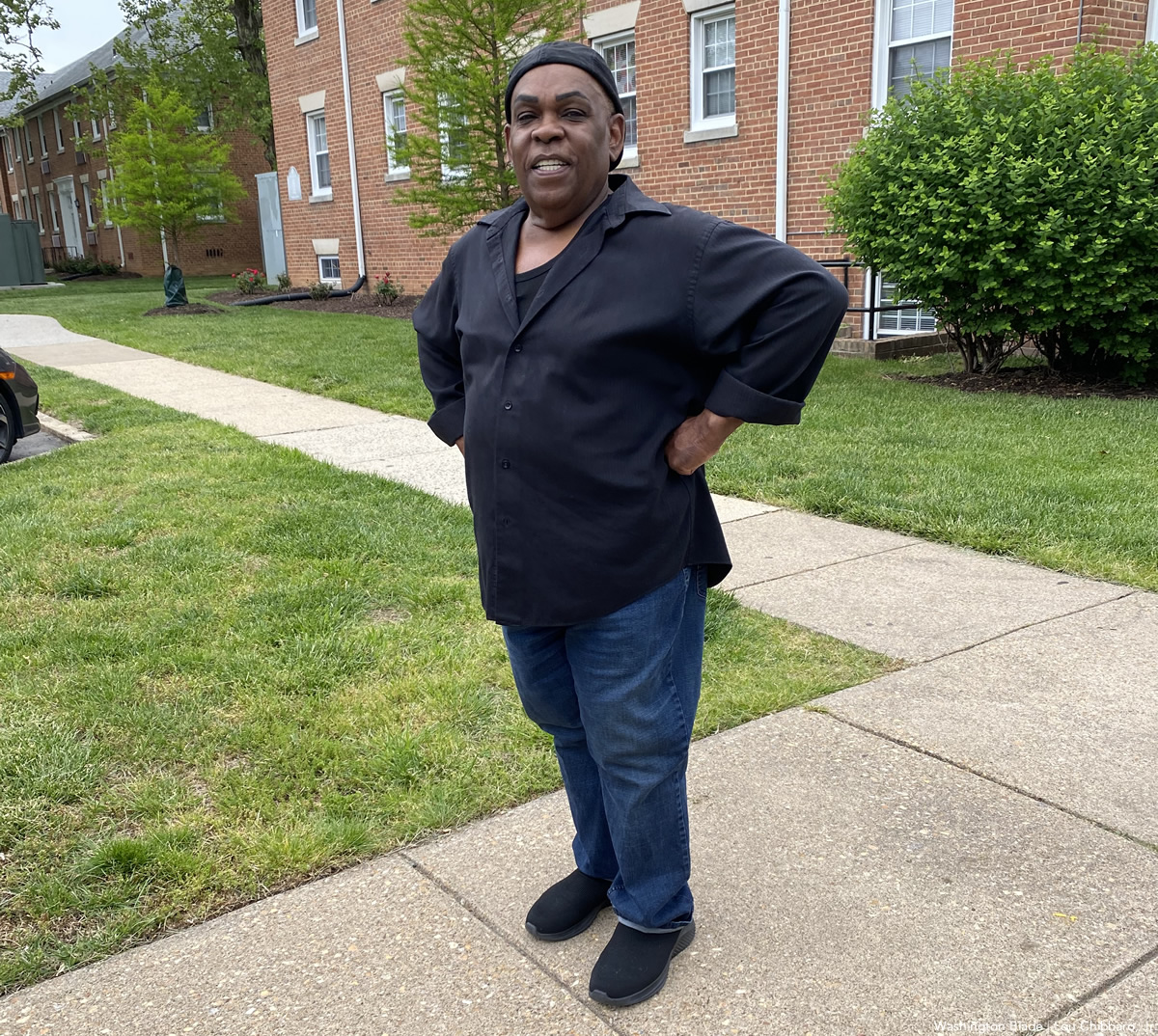
Robinson, 68, says he was born in Warrenton, Va., and grew up on a farm just outside Warrenton and raised by his grandparents. His first attempt at drag took place while in the 8th grade when he entered a school talent show portraying TV personality Flip Wilson’s drag character Geraldine Jones.
“All of my girlfriends, they helped get it together,” Robinson recalls. “I borrowed the wig from the school librarian,” he said, adding he bought a red dress and borrowed a pocketbook from someone. “And I won the contest.”
He didn’t do drag again until his senior year in high school, Robinson said, when he “pulled out Geraldine again” in a dramatic arts class. “I got an ‘A’ in dramatic arts,” he told the Blade, before graduating from Fauquier High School in June of 1974.
“Then I waited a year or so, and then I came out to do drag in 1975 in the fall,” he said. That began when a friend introduced him to the then gay nightclub Pier 9, located in the building that later became Ziegfeld’s-Secrets, where drag shows were held.
Robinson said he was impressed by the beauty of the drag performers while attending Pier 9 drag shows. “I’m like, oh, so I can do that too,” he said. And that’s exactly what he did. In October of that year, he entered a Halloween costume contest at the Pier, once again as the Geraldine Jones drag character, and won the contest in the comedy category.
From there, Robinson says, through people he met at the Pier he learned of the then D.C. gay bar Plus One on Capitol Hill, which also hosted drag shows. After auditioning and being approved as a drag performer at Plus One, the owner of the club, Bill Oats, assigned him the drag name Fanny Brice.
It was at the Plus One about a year later when Robinson met Mother Mame Dennis, the drag performer and lead organizer of the Academy of Washington, a local drag social club that organized drag events, including the Gay Miss Universe drag competition. The next day, an Academy of Washington member who performed at Plus One brought Robinson to an academy event.
It was there that Mame Dennis approached him and raised the issue of Robinson’s drag name. “She said, ‘Oh my dear, if you want to be in this group you need to change your name immediately,’” Robinson quoted Dennis as saying. “And I was like, yes ma’am. She said you need to be either Nell Carter or Ella Fitzgerald,” Robinson recounted.
“I was being a smart ass. I said, ‘I’ll take Ella Fitzgerald for $2.’ She said, ‘Oh, you’re funny.’ And she named me Ella Fitzgerald,” Robinson remembers. “And I was her first African-American daughter in the group.”
Through the Academy of Washington and others he met through the drag scene at Plus One and other D.C. gay bars, Robinson quickly learned what he calls the art form of drag and developed a following among those patronizing drag shows in D.C. It was through the academy that Robinson also met the owners of the then Other Side nightclub, Chris Jensen and Allen Carroll, who invited Robinson to begin performing at their club.
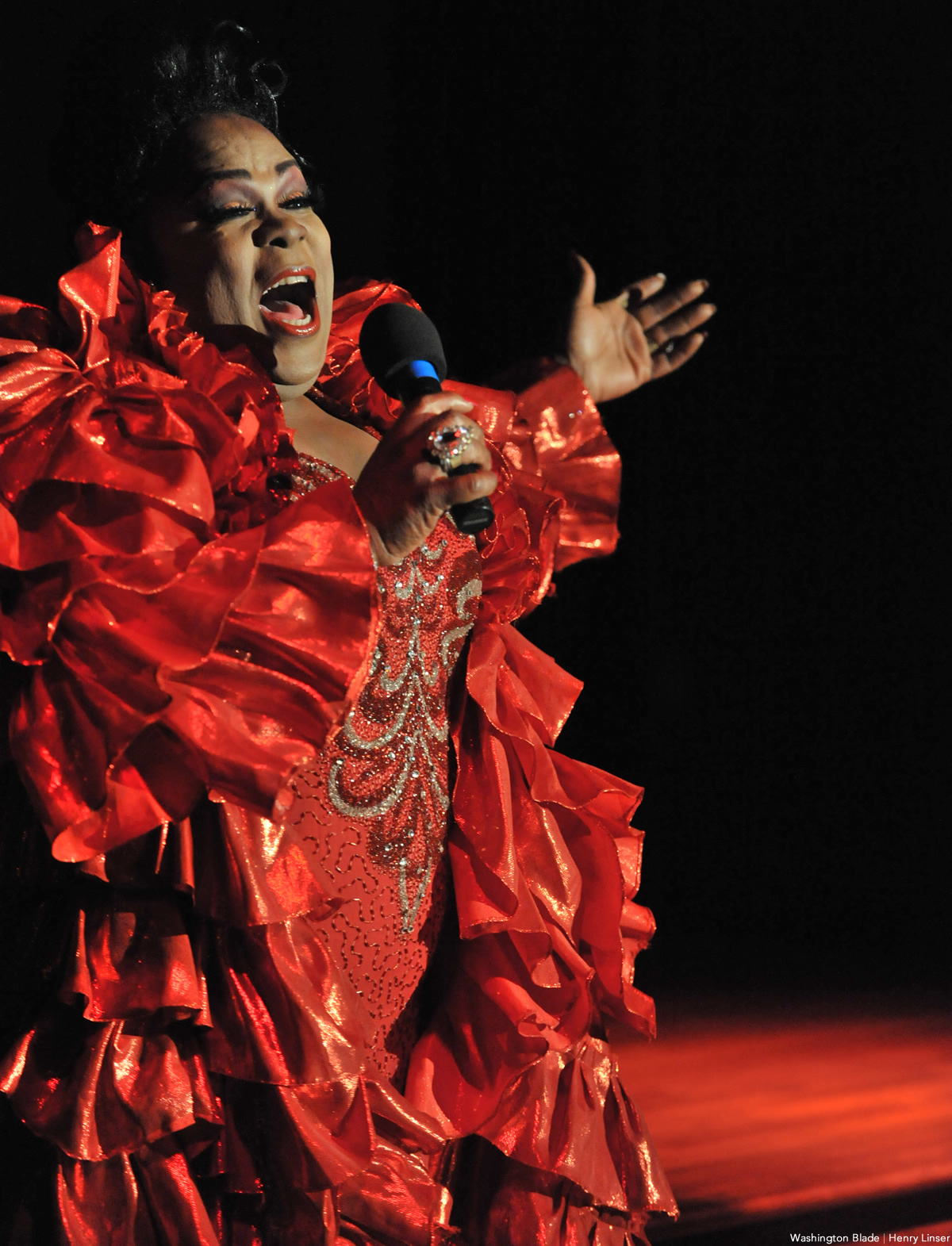
“There were five of us and we did the show on a Sunday night for 500 women,” Robinson says. “Because, remember, between Washington Square, the earlier name, and the Other Side, it was all women. There were no men allowed until around 1986,” he told the Blade. “So, every Sunday night we were doing drag shows for 500 women, from ’80 until ’85 or ’86.”
Around the time he began performing as Ella Fitzgerald, Robinson also began his other career as a hairstylist, which he says he continues at this time and will celebrate his 40th anniversary as a hairstylist in November of this year.
For much of that time, Robinson has been one of the sought-after stylists at the VSL Hair Salon at 1607 Connecticut Ave., N.W., in the Dupont Circle neighborhood. The salon recently came under new ownership and now operates under the name of Color Lab Salon at the same address.
As Robinson’s reputation as a drag performer became widely known, many of his salon clients referred to him as Ella and were regular patrons of the Ziegfeld’s-Secrets drag show.
By the time Jensen and Carroll renamed the Other Side as Ziegfeld’s-Secrets and through the time it relocated in the building on Half Street, S.W. and until its closing in 2020, Robinson took on the role as the emcee of the club’s Ladies of Illusion drag shows as well as that of one of the city’s most sought after drag performers, according to people who attended his shows.
In an Aug. 2, 2001, lengthy feature article, the Washington Post referred to Robinson and his Ella Fitzgerald character as the “doyenne of Washington drag queens.” The Post article recounted what those who have attended Robinson’s shows already knew – that he also took on the role of a stand-up comedian engaging audience members in on-the-spot banter, often inviting audience members to come on stage to chat with Ella.
“Is that your husband?” the Post article quoted Robinson asking a female audience member at one of the Ziegfeld’s-Secrets drag shows. When the woman replied that the person was her boyfriend, Ella said with an incredulous facial expression, “That little queen?” according to the Post article. The audience roared in laughter.
Robinson says among the highlights of his career as a drag performer have been the recognition he has received from his peers in the drag community, including from the Academy of Washington and its leader Mame Dennis.
“Once I changed my name to Ella Fitzgerald, Mame said, ‘My dear, one day you will be Miss Universe.’ And 10 years later, Mame crowned me Miss Gay Universe. I was the first African-American Miss Universe in 1986,” Robinson recounted.
He said the prospect of resuming his drag performances to the degree he did before Ziegfeld’s-Secrets closed was uncertain, in part, because he is dealing with a bout of sciatica that makes it difficult for him to walk and move about quickly.
“You might see me come out with a cane at the Pride show,” he said with a laugh.
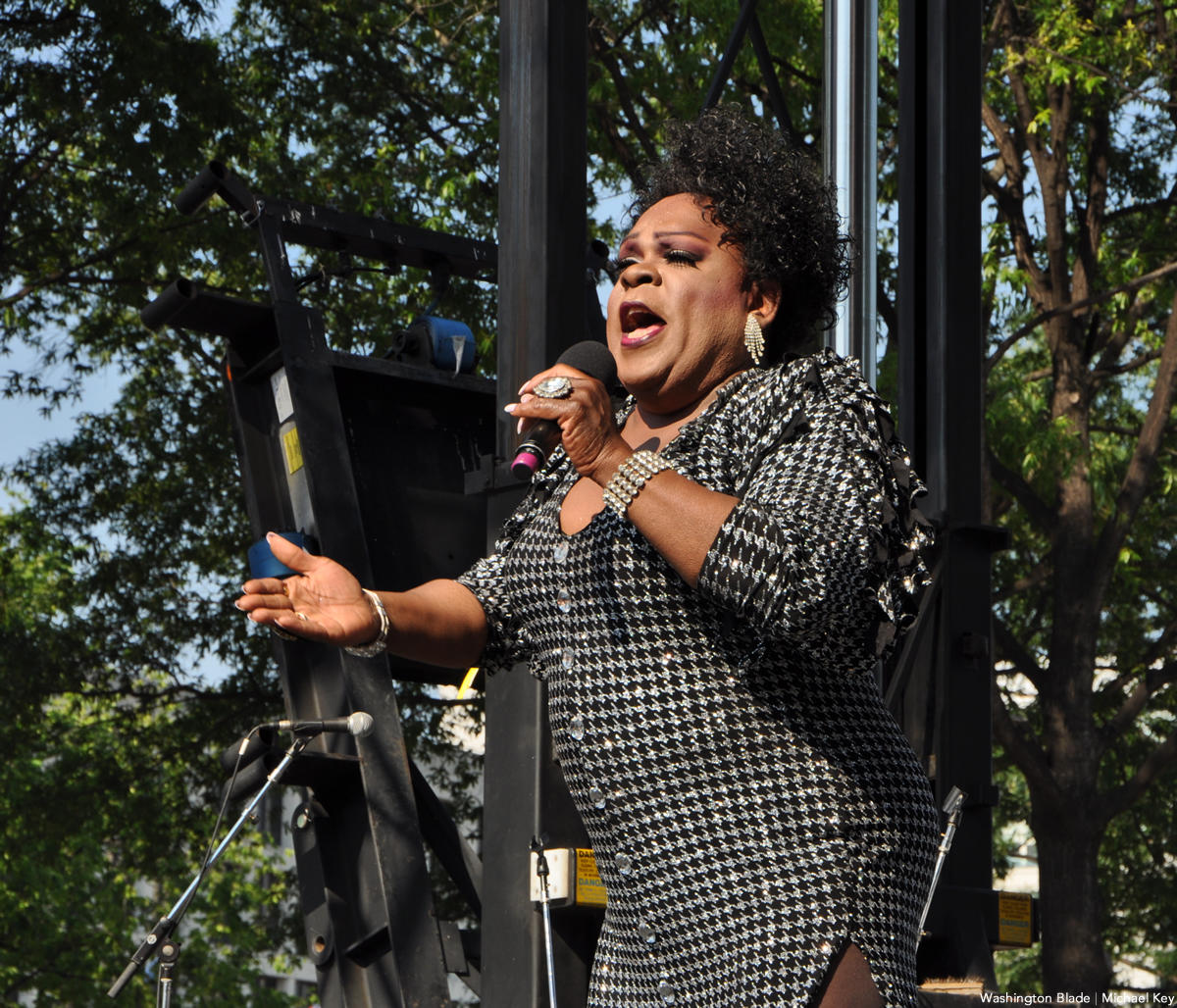
a&e features
Doug Spearman takes his chance
‘Noah’s Arc: The Movie’ debuted on Paramount+ last month

There’s no question that when Patrik-Ian Polk’s series “Noah’s Arc” premiered on Logo 20 years ago, it was a groundbreaking creation. The story of a group of Black gay men and their wonderful friendship. The titular arc was that of the cute main character, Noah (Darryl Stephens), and his close-knit circle of friends, including Chance played by gay actor Doug Spearman. This compelling and loving fraternity may, in fact, be what brought viewers back repeatedly, including a 2008 movie, “Noah’s Arc: Jumping the Broom,” as well as the 2020 “Noah’s Arc” short, and now, a new full-length feature “Noah’s Arc: The Movie,” debuting on Paramount+ on June 20. In the movie, filled with equal measures of laughs and tears, Chance, who has faced a devastating loss, finds his dependable friends there, ready to support and comfort him at a moment’s notice. I had the pleasure of speaking with Spearman the morning of the streaming premiere of “Noah’s Arc: The Movie.”
WASHINGTON BLADE: Doug, since the early 2000s, when the “Noah’s Arc” series premiered on Logo, you have been playing the character of Chance, including in the latest installment, “Noah’s Arc: The Movie.” What was it about Chance that appealed to you as an actor?
SPEARMAN: When Patrik (-Ian Polk) called me to ask me to play him (Chance), I was at JFK airport in the baggage claim, waiting for a suitcase. He explained what the part was. The thing that stuck out to me was the fact that Chance was in a long-term relationship with another Black man. And, they had a child; they had a 4-year-old daughter named Kenya. I had never seen two Black gay men raise a child on TV before. I thought it was the most revolutionary thing I’d ever seen. I immediately thought I’ve got to do this because that was something nobody had seen. I thought it was incredibly important to take the part.
BLADE: “Noah’s Arc: The Movie” was, once again, written and directed by Patrik-Ian Polk, who you just mentioned, is the creator of the entire franchise. What’s the secret to your long-standing working relationship?
SPEARMAN: [Laughs] the whole team, all of us, are like a band of brothers. We fight like brothers, we come together like brothers, we hash things out, we talk, because we’re all very different from our characters. I think the challenge of playing these guys and then uplifting these men, playing a part, especially something written by Patrik, is like solving a math equation. There’s always a challenge that’s enjoyable for me as an actor: to try to find out what it is that Patrik wants, and then how do I do it.
BLADE: I think you do a very good job of it.
SPEARMAN: Thank you very much
BLADE: In the years between “Jumping the Broom” and the new full-length movie, many changes have occurred, and the story addresses some of them, including gay widowhood, which is something that the aging community is now confronting, as well as mental health issues. Please say a few words about how you approached those subjects in the new movie.
SPEARMAN: I had a lot of loss in my life, right before we started shooting. Two months before we started shooting the first series, my mother died. I was going through the grief process through that whole first season. Since then, I’ve lost a lot of people in my life. In fact, when we started shooting the second season, the second week we were shooting, my ex died of a heart attack. I was having to fold that into what I was doing with my life on the set and off the set. You’ve got to show up and you’ve got to do your work. The first two seasons of “Noah’s Arc” are always tinged with the memory of grief. So, when I had to deal with the death that Chance faces (in the new movie), which is a significant death in his life, it wasn’t that hard to reach back, especially the scene in the graveyard. It was something that I unfortunately could pull from personal experience.
BLADE: Shifting gears, the movie features delightful cast surprises, including Jasmine Guy and TS Madison. Did you have a chance to interact with either or both when they were on set?
SPEARMAN: No, I didn’t have any scenes with Jasmine, and I missed her. I wish I had gotten to see her because I actually got to direct Jasmine for a CBS promo shoot for “Queen,” back in the early ‘90s. I had a huge crush on her when she was on “A Different World.” So, I really would have liked to reconnect. But TS and I got to see each other every day because I was in all her scenes. It was extraordinary being around somebody like that. That is one outspoken woman!
BLADE: Even though Beyoncé never makes an appearance in the movie, there’s a lot of talk about her. Would you say you are a Beyoncé fan?
SPEARMAN: Yes! I’m breathing! Yes, I’m a Beyoncé fan. I actually got the chance to meet her. I knew her mom. Her mom was extraordinary to me. She is in the second movie I directed. She also gave us a wedding gown to use in the very first scene of the movie. That family is extraordinarily important to me. Not only just to be a fan, but to be somebody who’s gotten to know them and work with them and see how hard they work. I don’t think anybody works as hard as Tina or Beyoncé.
BLADE: There was a recent news item about gay actor Benito Skinner of the Amazon Prime series “Overcompensating” being told not to bother auditioning for straight roles. As an out actor yourself, how important do you think it is for queer characters to be portrayed by queer actors, and vice versa?
SPEARMAN: Being queer is a multifaceted identity. There’s no one kind of queer person. I think finding the best actor that’s your first circle of casting. I think one of the joys about being an actor is that you get to play different parts. I play straight guys all the time. Dads and husbands and things like that. I think a lot of people are told not to do it. In fact, I wouldn’t be Chance if the actor who was originally cast as Chance hadn’t been pulled out of the series by his agents because they didn’t want him to play a gay character.
BLADE: That’s amazing! Thank you for sharing that. Without giving away too much, the ending of the movie is a little ambiguous, even ending with a question mark. If there was a “Noah’s Arc: The Movie” sequel, would you come back for that?
SPEARMAN: Yeah! A lot of it would depend on what Chance’s journey is going to be like. Patrik and I have conversations like that all the time. He’s very interested and supportive of input. I hope I would be, as we all would be, part of the creative growth with these characters. They live in Patrik’s head, and he writes them, but we’re the ones who have to flesh them out. It’s a conversation, it’s always a conversation.
BLADE: You are currently performing in Molière’s “The Imaginary Invalid” as part of the New Orleans Shakespeare Festival at Tulane. What has this experience been like for you?
SPEARMAN: It’s extraordinary! I started on stage when I was seven. There’s nothing like working with a live audience and having that immediacy. I’m working with an extraordinarily talented cast in a really great play, and I have some of the best scene partners I could ever want.
BLADE: Are there any upcoming film or TV projects you’d like to mention?
SPEARMAN: I’m still a writer, and I’m still a director, and I’ve still got scripts that I would like to make. I have a little something that’s a cross between “Treme” and “Bridgerton” that I want to do. I’m always trying to figure out what the next thing is.
a&e features
Visit Cambridge, a ‘beautiful secret’ on Maryland’s Eastern Shore
New organization promotes town’s welcoming vibe, LGBTQ inclusion

CAMBRIDGE, Md. — Driving through this scenic, historic town on Maryland’s Eastern Shore, you’ll be charmed by streets lined with unique shops, restaurants, and beautifully restored Victorian homes. You’ll also be struck by the number of LGBTQ Pride flags flying throughout the town.
The flags are a reassuring signal that everyone is welcome here, despite the town’s location in ruby red Dorchester County, which voted for Donald Trump over Kamala Harris by a lopsided margin. But don’t let that deter you from visiting. A new organization, Proudly Cambridge, is holding its debut Pride event this weekend, touting the town’s welcoming, inclusive culture.
“We stumbled on a beautiful secret and we wanted to help get the word out,” said James Lumalcuri of the effort to create Proudly Cambridge.
The organization celebrates diversity, enhances public spaces, and seeks to uplift all that Cambridge has to share, according to its mission statement, under the tagline “You Belong Here.”
The group has so far held informal movie nights and a picnic and garden party; the launch party is June 28 at the Cambridge Yacht Club, which will feature a Pride celebration and tea dance. The event’s 75 tickets sold out quickly and proceeds benefit DoCo Pride.
“Tickets went faster than we imagined and we’re bummed we can’t welcome everyone who wanted to come,” Lumalcuri said, adding that organizers plan to make “Cheers on the Choptank” an annual event with added capacity next year.
One of the group’s first projects was to distribute free Pride flags to anyone who requested one and the result is a visually striking display of a large number of flags flying all over town. Up next: Proudly Cambridge plans to roll out a program offering affirming businesses rainbow crab stickers to show their inclusiveness and LGBTQ support. The group also wants to engage with potential visitors and homebuyers.
“We want to spread the word outside of Cambridge — in D.C. and Baltimore — who don’t know about Cambridge,” Lumalcuri said. “We want them to come and know we are a safe haven. You can exist here and feel comfortable and supported by neighbors in a way that we didn’t anticipate when we moved here.”

Lumalcuri, 53, a federal government employee, and his husband, Lou Cardenas, 62, a Realtor, purchased a Victorian house in Cambridge in 2021 and embarked on an extensive renovation. The couple also owns a home in Adams Morgan in D.C.
“We saw the opportunity here and wanted to share it with others,” Cardenas said. “There’s lots of housing inventory in the $300-400,000 range … we’re not here to gentrify people out of town because a lot of these homes are just empty and need to be fixed up and we’re happy to be a part of that.”
Lumalcuri was talking with friends one Sunday last year at the gazebo (affectionately known as the “gayzebo” by locals) at the Yacht Club and the idea for Proudly Cambridge was born. The founding board members are Lumalcuri, Corey van Vlymen, Brian Orjuela, Lauren Mross, and Caleb Holland. The group is currently working toward forming a 501(c)3.
“We need visibility and support for those who need it,” Mross said. “We started making lists of what we wanted to do and the five of us ran with it. We started meeting weekly and solidified what we wanted to do.”
Mross, 50, a brand strategist and web designer, moved to Cambridge from Atlanta with her wife three years ago. They knew they wanted to be near the water and farther north and began researching their options when they discovered Cambridge.
“I had not heard of Cambridge but the location seemed perfect,” she said. “I pointed on a map and said this is where we’re going to move.”
The couple packed up, bought a camper trailer and parked it in different campsites but kept coming back to Cambridge.
“I didn’t know how right it was until we moved here,” she said. “It’s the most welcoming place … there’s an energy vortex here – how did so many cool, progressive people end up in one place?”
Corey van Vlymen and his husband live in D.C. and were looking for a second home. They considered Lost River, W.Va., but decided they preferred to be on the water.
“We looked at a map on both sides of the bay and came to Cambridge on a Saturday and bought a house that day,” said van Vlymen, 39, a senior scientist at Booz Allen Hamilton. They’ve owned in Cambridge for two years.
They were drawn to Cambridge due to its location on the water, the affordable housing inventory, and its proximity to D.C.; it’s about an hour and 20 minutes away.
Now, through the work of Proudly Cambridge, they hope to highlight the town’s many attributes to residents and visitors alike.
“Something we all agree on is there’s a perception problem for Cambridge and a lack of awareness,” van Vlymen said. “If you tell someone you’re going to Cambridge, chances are they think, ‘England or Massachusetts?’”
He cited the affordability and the opportunity to save older, historic homes as a big draw for buyers.
“It’s all about celebrating all the things that make Cambridge great,” Mross added. “Our monthly social events are joyful and celebratory.” A recent game night drew about 70 people.
She noted that the goal is not to gentrify the town and push longtime residents out, but to uplift all the people who are already there while welcoming new visitors and future residents.
They also noted that Proudly Cambridge does not seek to supplant existing Pride-focused organizations. Dorchester County Pride organizes countywide Pride events and Delmarva Pride was held in nearby Easton two weeks ago.
“We celebrate all diversity but are gay powered and gay led,” Mross noted.
To learn more about Proudly Cambridge, visit the group on Facebook and Instagram.
What to see and do
Cambridge, located 13 miles up the Choptank River from the Chesapeake Bay, has a population of roughly 15,000. It was settled in 1684 and named for the English university town in 1686. It is home to the Harriet Tubman Museum, mural, and monument. Its proximity to the Blackwater National Wildlife Refuge makes it a popular stop for birders, drawn to more than 27,000 acres of marshland dubbed “the Everglades of the north.”
The refuge is walkable, bikeable, and driveable, making it an accessible attraction for all. There are kayaking and biking tours through Blackwater Adventures (blackwateradventuresmd.com).
Back in town, take a stroll along the water and through historic downtown and admire the architecture. Take in the striking Harriet Tubman mural (424 Race St.). Shop in the many local boutiques, and don’t miss the gay-owned Shorelife Home and Gifts (421 Race St.), filled with stylish coastal décor items.
Stop for breakfast or lunch at Black Water Bakery (429 Race St.), which offers a full compliment of coffee drinks along with a build-your-own mimosa bar and a full menu of creative cocktails.
The Cambridge Yacht Club (1 Mill St.) is always bustling but you need to be a member to get in. Snapper’s on the water is temporarily closed for renovations. RaR Brewing (rarbrewing.com) is popular for craft beers served in an 80-year-old former pool hall and bowling alley. The menu offers burgers, wings, and other bar fare.
For dinner or wine, don’t miss the fantastic Vintage 414 (414 Race St.), which offers lunch, dinner, wine tasting events, specialty foods, and a large selection of wines. The homemade cheddar crackers, inventive flatbreads, and creative desserts (citrus olive oil cake, carrot cake trifle) were a hit on a recent visit.
Also nearby is Ava’s (305 High St.), a regional chain offering outstanding Italian dishes, pizzas, and more.
For something off the beaten path, visit Emily’s Produce (22143 Church Creek Rd.) for its nursery, produce, and prepared meals.
“Ten minutes into the sticks there’s a place called Emily’s Produce, where you can pay $5 and walk through a field and pick sunflowers, blueberries, you can feed the goats … and they have great food,” van Vlymen said.
As for accommodations, there’s the Hyatt Regency Chesapeake Bay (100 Heron Blvd. at Route 50), a resort complex with golf course, spa, and marina. Otherwise, check out Airbnb and VRBO for short-term rentals closer to downtown.
Its proximity to D.C. and Baltimore makes Cambridge an ideal weekend getaway. The large LGBTQ population is welcoming and they are happy to talk up their town and show you around.
“There’s a closeness among the neighbors that I wasn’t feeling in D.C.,” Lumalcuri said. “We look after each other.”
a&e features
James Baldwin bio shows how much of his life is revealed in his work
‘A Love Story’ is first major book on acclaimed author’s life in 30 years

‘Baldwin: A Love Story’
By Nicholas Boggs
c.2025, FSG
$35/704 pages
“Baldwin: A Love Story” is a sympathetic biography, the first major one in 30 years, of acclaimed Black gay writer James Baldwin. Drawing on Baldwin’s fiction, essays, and letters, Nicolas Boggs, a white writer who rediscovered and co-edited a new edition of a long-lost Baldwin book, explores Baldwin’s life and work through focusing on his lovers, mentors, and inspirations.
The book begins with a quick look at Baldwin’s childhood in Harlem, and his difficult relationship with his religious, angry stepfather. Baldwin’s experience with Orilla Miller, a white teacher who encouraged the boy’s writing and took him to plays and movies, even against his father’s wishes, helped shape his life and tempered his feelings toward white people. When Baldwin later joined a church and became a child preacher, though, he felt conflicted between academic success and religious demands, even denouncing Miller at one point. In a fascinating late essay, Baldwin also described his teenage sexual relationship with a mobster, who showed him off in public.
Baldwin’s romantic life was complicated, as he preferred men who were not outwardly gay. Indeed, many would marry women and have children while also involved with Baldwin. Still, they would often remain friends and enabled Baldwin’s work. Lucien Happersberger, who met Baldwin while both were living in Paris, sent him to a Swiss village, where he wrote his first novel, “Go Tell It on the Mountain,” as well as an essay, “Stranger in the Village,” about the oddness of being the first Black person many villagers had ever seen. Baldwin met Turkish actor Engin Cezzar in New York at the Actors’ Studio; Baldwin later spent time in Istanbul with Cezzar and his wife, finishing “Another Country” and directing a controversial play about Turkish prisoners that depicted sexuality and gender.
Baldwin collaborated with French artist Yoran Cazac on a children’s book, which later vanished. Boggs writes of his excitement about coming across this book while a student at Yale and how he later interviewed Cazac and his wife while also republishing the book. Baldwin also had many tumultuous sexual relationships with young men whom he tried to mentor and shape, most of which led to drama and despair.
The book carefully examines Baldwin’s development as a writer. “Go Tell It on the Mountain” draws heavily on his early life, giving subtle signs of the main character John’s sexuality, while “Giovanni’s Room” bravely and openly shows a homosexual relationship, highly controversial at the time. “If Beale Street Could Talk” features a woman as its main character and narrator, the first time Baldwin wrote fully through a woman’s perspective. His essays feel deeply personal, even if they do not reveal everything; Lucian is the unnamed visiting friend in one who the police briefly detained along with Baldwin. He found New York too distracting to write, spending his time there with friends and family or on business. He was close friends with modernist painter Beauford Delaney, also gay, who helped Baldwin see that a Black man could thrive as an artist. Delaney would later move to France, staying near Baldwin’s home.
An epilogue has Boggs writing about encountering Baldwin’s work as one of the few white students in a majority-Black school. It helpfully reminds us that Baldwin connects to all who feel different, no matter their race, sexuality, gender, or class. A well-written, easy-flowing biography, with many excerpts from Baldwin’s writing, it shows how much of his life is revealed in his work. Let’s hope it encourages reading the work, either again or for the first time.





